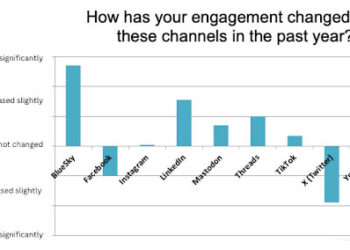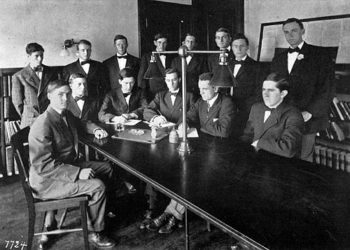We spend a lot of time talking about “access”, particularly with the goal of informing the general public about the discoveries and the importance of academic research. While the value of making highly technical research papers available remains open to debate (see the comments here for the latest round), researchers themselves can play a much bigger role in outreach efforts. Doing this well, however, is no easy task.
As a former science books editor, I can’t tell you how many proposals I received from researchers looking to write about their complex subject area for a lay audience. With rare exceptions, these proposals would fall apart in the actual writing of a sample chapter. Each author would run into the common problem of either assuming that the reader knew important background information (resulting in a book that was beyond most lay readers) or explaining those basic concepts to the reader (what is DNA?). This usually turned the book into a boring textbook and lost the reader’s attention before ever getting to the interesting stuff.
This is why we have such reverence for figures like Richard Feynman, Carl Sagan and Neil deGrasse Tyson. The ability to translate complex scientific concepts into understandable and entertaining stories is a rare gift.
Research institutions put a great deal of effort into trying to tell these sorts of stories. Public support, particularly through donations, is a hugely important channel through which research gets funded. Beyond the direct donations, having an informed public that recognizes the importance of research is critical for continued governmental support.
Johns Hopkins University has done a really nice job over the last year or so creating their series of “Science: Out of the Box” videos featuring their researchers explaining what they do to the general public. Rather than a dry lecture, each scientist was given a box of toys and challenged to explain their research using them as props. This challenge gives the researchers a relatable and entertaining framing device to help keep them grounded. The results are both informative and compelling and serve as a good example of someone getting this type of outreach right.
In the sample below, Andrew Ewald (full disclosure, a friend and former labmate) explains his lab’s cancer metastasis research using a few cans of Play-Doh.
Discussion
4 Thoughts on "Science: Out of the Box, Outreach Done Right"
My sample size of one– my high school junior son on Spring Break who watched Mollie Meffert explaining research on micro-RNA and protein connections in the brain–gives Hopkins’ Science out of the Box a big thumbs up. Science geeky anyway, he still summarized her summary very effectively. How widely are these circulated? I see 2500 views for this video on YouTube.
There are a bunch of efforts to bring historical research (either sources, such as Rebecca Onion’s The Vault blog for Slate, or interpretation, via new initiatives by the Atlantic and others) to general readers. I find them all pretty interesting. What publishers or aggregators can do is even more interesting — to me, anyway. I wonder what people think about JSTOR Daily (“Where News Meets its Scholarly Match”)? I don’t know how much readership it’s attracting, and they haven’t featured any of our work at the Omohundro (we have our books on their platform, too) so I haven’t had any particular reason to track it.
I love the play-doh cells, and the visual demonstration of metastasis.
There were two glancingly made points that are immensely important in increasing science literacy, support for and understanding of science:
1. Dr. Ewald said: “…this is what we work for. … The people I have are some of the smartest people in the world. They’re trying to understand how this works.” Researchers love their subject; their work is about understanding, and they care about how the outcomes of their very basic science affects people’s lives. Even if the “cure” is far, far down the road, it matters that we get on the road!
2. Immediately following was this: “It’s a hard process; it’s a slow process; and a lot of days the experiments don’t work” Research, however worthy and intelligent, is “inefficient.” You don’t do an experiment, look at a graph on the computer and it’s all clear and perfect and proved. Part of the current distrust of science comes from many people NOT understanding that research moves incrementally from hypothesis to support to formalized “theory.” You know…theory, like the theory of evolution, and the theory of gravity. Knowing that something is, in fact, true doesn’t close the door on continuing exploration of mechanism. If more people understood that real science is not a perfect path, but a steady path, I think they’d be less likely to react to changes with “They don’t know what they’re talking about! The whole endeavor is flawed!”
Accept that research is a continuous process of “search” – continuous process of learning.



